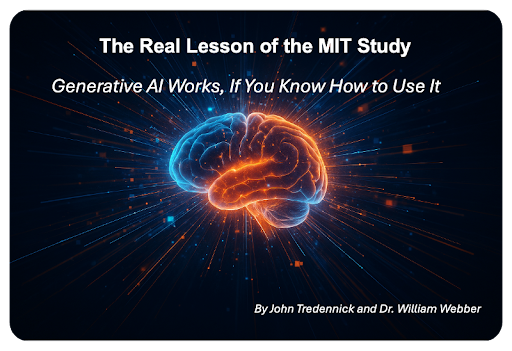From Search Hits to Answers: How GenAI Solved Complex Discovery Challenges at HKA's "Hands On" AI Program in London

By John Tredennick and Dr William Webber
Headlines this week are buzzing about an MIT study claiming that 95% of enterprise GenAI projects have failed to deliver measurable results. (MIT report – The GenAI Divide: State of AI in Business 2025.) Some pundits are quick to declare the end of the AI boom and to warn of an “AI bubble” about to burst.
But that’s not what the study says.
The MIT researchers describe a “GenAI Divide” — a gap between the 5% of projects that achieve transformative results and the 95% that stall. The failures, they found, are not caused by weak models or bad regulation. They happen because tools don’t fit workflows, don’t integrate with operations, and don’t deliver measurable ROI. In other words, it’s not the technology that fails, but the way it’s deployed.
And here’s the insight most headlines miss: the small share of projects that succeed are already delivering profound impact.
At Merlin, we are proving what it looks like to be on the right side of the GenAI Divide. Our mission is to re-engineer investigations and discovery for the GenAI era. Working with some of the largest law firms, corporations, and service providers in the world, we’ve moved well beyond pilots into production systems that deliver results at scale.
1. Transcripts at Scale: 70,000 a Year
For decades, deposition summaries have been a manual, time-intensive task. Lawyers or paralegals would spend hours on each transcript, with costs running from $2,500 to $5,000. Multiply that across thousands of depositions and the fees are staggering.
Merlin has turned that equation upside down. Today, our AI-driven system is producing more than 6,000 deposition summaries every month, over 70,000 a year, for two of the largest court reporting companies in the world. Each one includes a detailed abstract with page-line citations, delivered in hours instead of weeks.
At a cost of about $1 per page, the economics are striking. Across 75,000 transcripts, the savings add up to well over $100 million in avoided legal fees every year.
This isn’t a pilot project. It is production at a level that is already reshaping how discovery is done.
2. Trial Arguments in Hours, Not Days or Weeks
Crafting persuasive opening and closing arguments has traditionally required teams of senior attorneys working for weeks, sometimes months, at enormous cost.
With Merlin’s Alchemy platform, powered by multiple large language models, those timelines collapse. We have shown that credible, persuasive trial arguments can be generated in hours by processing tens of thousands of pages of complex case material at once.
What began as a “can AI really do this” challenge is now a repeatable process. Lawyers are using GenAI to draft, test, and even anticipate opposing arguments. This accelerates trial preparation while allowing attorneys to focus on strategy. At scale, this shift translates into hundreds of millions of dollars in saved legal time and a fundamental change in how firms approach case preparation.
3. Privilege Review Reinvented
Privilege review has always been one of the most expensive, high-stakes bottlenecks in litigation. It is usually reserved for senior attorneys billing at premium rates. For a client with 30,000 potentially privileged documents, the traditional review cost was prohibitive.
Merlin’s GenAI system not only reduced the cost to about 15 percent of traditional review, it delivered better results. Our models consistently matched and even outperformed senior lawyer judgments, with 98 to 99 percent accuracy, and corrected more than half of the attorneys’ own errors when shown the AI’s reasoning.
This is not just cheaper. It is more reliable, more scalable, and more consistent than human-only review. Applied across millions of documents in large-scale litigation, the potential savings and quality improvements are transformative.
Why Merlin Succeeds Where Others Fail
The MIT study makes clear that most organizations remain on the wrong side of the GenAI Divide. They launch pilots that never scale, invest in generic tools that don’t fit, or try to build systems internally that stall.
The winners take a different path. They focus on clear, high-value workflows. They partner with specialized vendors rather than build from scratch. And they measure success not in flashy demos, but in business outcomes.
That’s exactly what we do at Merlin. Our solutions are embedded directly into legal processes, delivered as specialized services, and judged on measurable ROI. Far from being a bubble, this is real transformation happening today.
The Bigger Picture
Generative AI is not failing. It is dividing.
Most organizations are stuck on the wrong side of the GenAI Divide, where pilots stall and investments don’t pay off. But for those who cross it, the transformation is immediate and profound.
That is why I am proud to be building Merlin with our Chief Data Scientist, Dr. William Webber, one of the world’s leading experts in information retrieval and statistical evaluation. Together, we are showing that GenAI isn’t just hype. It is working today, at scale, for some of the toughest challenges in law.
For the skeptics, here is the reality:
70,000 deposition summaries a year, saving over $100 million in fees
Trial arguments drafted in hours, not months
Privilege reviews at 15 percent of the cost and higher accuracy than human review
That is not the end of AI. That is what it looks like to cross the GenAI Divide.

About the Author
John Tredennick (jt@merlin.tech) is the CEO and Founder of Merlin Search Technologies, a software company leveraging generative AI and cloud technologies to make investigation and discovery workflow faster, easier, and less expensive. Prior to founding Merlin, Tredennick had a distinguished career as a trial lawyer and litigation partner at a national law firm.
With his expertise in legal technology, he founded Catalyst in 2000, an international ediscovery technology company that was acquired in 2019 by a large public company. Tredennick regularly speaks and writes on legal technology and AI topics, and has authored eight books and dozens of articles. He has also served as Chair of the ABA’s Law Practice Management Section.

Dr. William Webber (WWebber@Merlin.Tech) is the Chief Data Scientist of Merlin Search Technologies. He completed his PhD in Measurement in Information Retrieval Evaluation at the University of Melbourne under Professors Alistair Moffat and Justin Zobel, and his post-doctoral research at the E-Discovery Lab of the University of Maryland under Professor Doug Oard.
With over 30 peer-reviewed scientific publications in the areas of information retrieval, statistical evaluation, and machine learning, he is a world expert in AI and statistical measurement for information retrieval and ediscovery. He has almost a decade of industry experience as a consulting data scientist to ediscovery software vendors, service providers, and law firms.